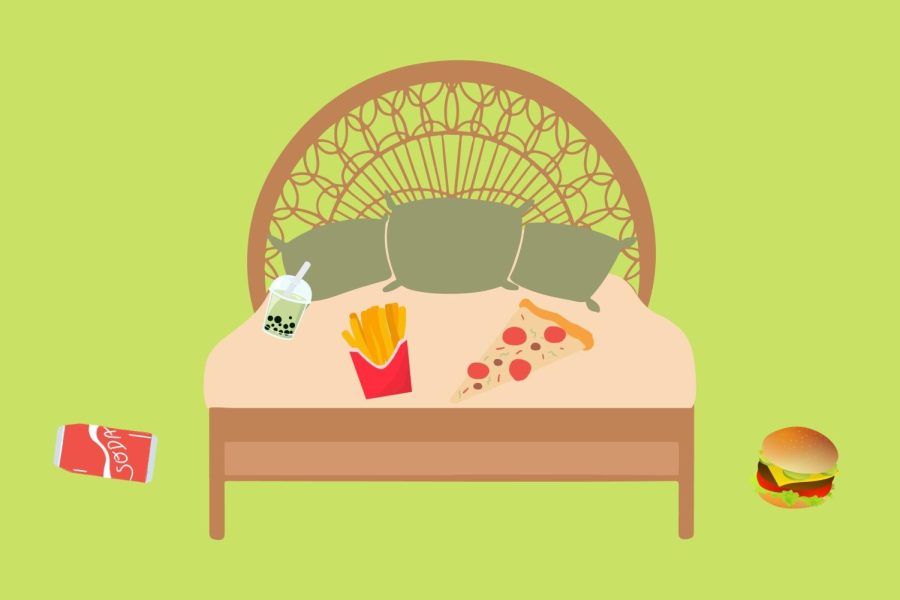Late isn’t great: Feinberg researchers find mechanism behind health risks of nighttime eating
Researchers observed two groups of mice on high-fat diets for the study: one group fed during the mice’s active period, when they should be eating, and another group fed during their inactive period when they should be sleeping.
February 24, 2023
Many have been scolded by their parents for eating late at night. Unfortunately, the parents are right on this one.
Feinberg School of Medicine researchers published a research article in October revealing how eating at night decreases the body’s ability to turn energy from food into heat that leaves the body — a process known as thermogenesis.
First authored by Chelsea Hepler, a postdoctoral fellow in the Bass Lab, researchers observed two groups of mice on high-fat diets for the study. One group fed during the mice’s active period, when they should be eating, and another group fed during their inactive period, when they should be sleeping.
Feinberg Prof. Joe Bass, principal investigator for the study and chief of endocrinology in the Department of Medicine, said food that organisms consume is converted into ATP by the mitochondria to provide energy to cells — or dissipated as energy in a process called thermogenesis.
When the mice ate during their inactive zones, thermogenesis decreased, which meant the amount of food stored as energy increased. The study found that this correlation could indicate why late night eating increases the risk of obesity and diabetes.
The researchers, led by Hepler, tested the relationship between thermogenesis and weight gain by manipulating the transcriptional repressor protein ZFP423 within the mice, Bass said. The protein was discovered by Duke University Prof. Rana Gupta, who was a key contributor to the research, Bass said.
When the researchers removed ZFP423 from the mice to increase thermogenesis, they found the mice were less likely to gain weight and more resistant to glucose despite being fed high-fat diets during their inactive period.
Dr. Anita Bhardwaj, a pediatrician at University Hospitals in Cleveland, said knowing the link between thermogenesis and weight gain is important. This is because the knowledge helps researchers find specific solutions to mitigate the health outcomes of eating late at night, such as obesity and diabetes.
“Maybe one day we can figure out a way to trick the fat cells into burning more calories at night,” Bhardwaj said with a chuckle.
But, Bass said the study’s research doesn’t necessarily support diet trends like intermittent fasting because there are many unknown mechanisms explaining how humans process food.
He added that the research associated with the study doesn’t necessarily apply to young and healthy college students, since dominant factors for good eating habits involve caloric intake and nutrition.
“(The results of the study are) very important in the setting of critical illness where somebody doesn’t have the option of when they’re eating, and they’re provided the food consistently at a time that’s outside of their circadian phase,” Bass said.
Bhardwaj said eating late at night often means eating less healthy food, which can also affect a person’s weight. People tend to eat snacks high in sugar, calories and fat late at night, she said.
Weinberg junior Benny Zhang said he used to order chicken wings and Triple Whoppers from Burger King at 1 or 2 a.m. while he was enrolled in organic chemistry and biology his sophomore year.
“My whole eating schedule is dependent on my work schedule,” Zhang said. “If I have an exam the next day, I’ll be home at midnight eating dinner.”
He added that the strenuous workload from his courses made it difficult for him to maintain a healthy eating schedule.
Bhardwaj said students who need to snack after dark, like Zhang, should try to eat healthy snacks that are high in protein, such as whole grain crackers with peanut butter, yogurt, whole-grain toast and cheese with fruit.
“It’s not just old people wisdom — there’s proof now that it’s actually good for your body,” Bhardwaj said.
Email: anitali2025@u.northwestern.edu
Twitter: @lifeisfab02
Related Stories:
— NU Declassified: The Late Night Debate — Fran’s versus Lisa’s
— Evanston Burger King ends its reign as empty building gets demolished


